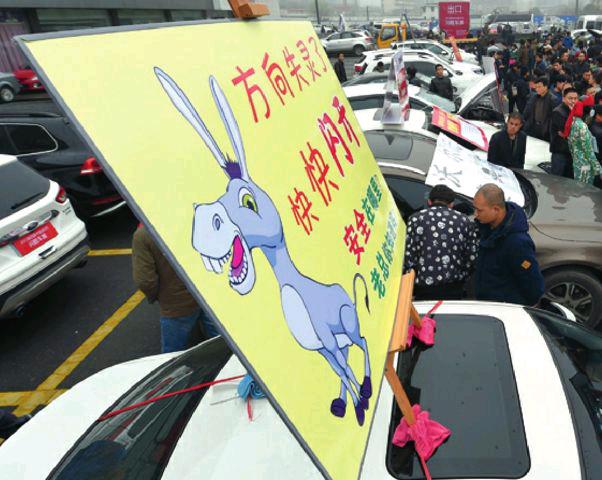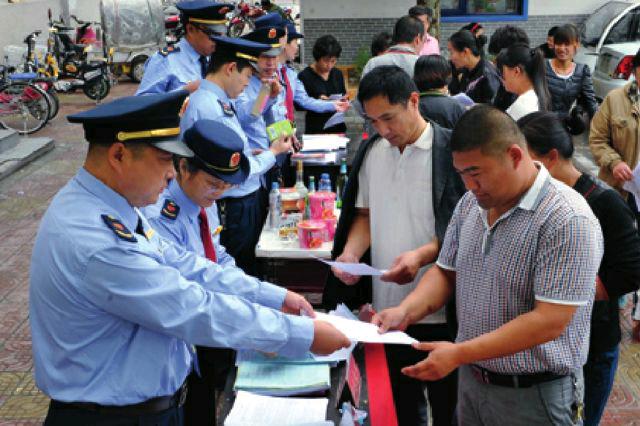A Shopper’s Defense
2015-04-10ByZhouXiaoyan
By+Zhou+Xiaoyan
Zhao Ping, a 27-year-old resident of Beijings Fengtai District, is an online shopping fanatic. Her craze for online purchases was further fueled over the past year when Web retailers gave her the right to return her products after she receives them, as is required by a revised law on protection of consumer rights.
“I bought a new dress online on March 13. When I got it, I found the size was too big and I contacted the seller for a refund. She agreed without any hesitation or questions,” Zhao said. “Then, I called the express delivery service to claim the dress and filled in a very simple form online. All thats left to do is to wait for the money to go back into my account.”
According to data from the State Administration for Industry and Commerce(SAIC), the trade value of online shopping totaled 2.79 trillion yuan ($447.6 billion) in 2014, accounting for 10 percent of the total social retail sales. Despite apparent convenience brought about by online shopping, it produces a cluster of problems, among which the most prominent issue would be the difficulty to return products customers regret buying.
At least, that was an issue until March 15, 2014, when the revised Law on the Protection of Consumer Rights and Interests took effect. Since online shoppers cannot see or touch the real product before deciding to purchase it, the revised law gives customers the right to return after receiving the product. Customers may return goods within seven days of receipt with- out giving any explanations if they make the purchase decision remotely, including online shopping, TV shopping and mail order. Several special categories are exempted from the law.
Throughout the past year, consumersright-protection awareness has been on the rise. Other illegal actions like imparity clauses, false advertising and discriminative policies have become more difficult to get away with in the Chinese market. However, law enforcement agencies claim that challenges exist in the implementation of the law itself.
Better protection
In the revised Law on the Protection of Consumer Rights and Interests, the scope of consumer rights and interests has been expanded upon in detail. Issues such as protecting personal information, replacing and returning of commodities and services, increasing penalties for fraudulent behavior, and defending consumers privacy, property and health rights all fall within this scope.
According to the SAIC, Chinas industry and commerce authorities nationwide handled more than 1.16 million consumer complaints last year, up 14.3 percent from the previous year. The number of complaints and the increase were the highest in five years, the SAIC said.
“The soaring figures show that infringement of consumer rights are still a frequent occurrence,” said Yang Hongcan, Director of the Consumer Protection Bureau under the SAIC.
Liu Junhai, Director of the Business Law Center at the Beijing-based Renmin University of China, said the consumption environment has improved profoundly during the past year, owing to the new law.
“Changes come from different aspects. For the sake of long-term benefits and development, businesses have more respect for consumers. Consumers have more awareness in protecting their rights. In addition, various government departments have intensified the protection of consumer rights and interests, and industry associations have played their due role in self-disciplining the industry,” Liu said.
Zhang Mao, Minister of the SAIC, said the regulator is trying every method to increase the cost of breaking laws for businesses, sometimes to the point that businesses can hardly afford the penalty.
“Only in this way can the market order be substantially improved,” Zhang said.
China Consumers Association (CCA), a nationwide organization for receiving consumer complaints and protecting consumer rights established in 1984, received 619,415 complaints in 2014, and 87.82 percent of them were settled, helping consumers to recover compensation totaling 920 million yuan ($148 million), according to a report released by the CCA.
“To tackle consumer right infringements, efforts should not only come from government supervision but also from company self-discipline, industry self-regulation as well as supervision from everyone in society,” said Chang Yu, Secretary General of the CCA.
According to Yang, head of SAICs Consumer Protection Bureau, the power of the new law has yet to be fully unleashed.
“The revised consumer rights law aims at giving consumers the right to say ‘no.However, its power is still limited at this stage,” Yang said. “Right now, 18 provinces have started to revise their local regulations according to the revised consumer rights law in order to intensify consumer protection.”
Implementation issues
Although high hopes have been pinned on the revised consumer rights law to prevent personal information leaks as one provision of the new law prohibits it, the implementation of the provision is hardly satisfying—and thats not the only part of the revised law that seems better in theory than in practice.
On March 15, the 315 Evening Gala aired by the China Central Television (CCTV) uncovered consumer rights violations. In conjunction with International Consumer Rights Day, the program has been held for 25 years in a row to expose business misconduct and help consumers protect their rights.
This year, exposed business misconduct includes fraud at famous car brands dealerships, fake gasoline, deceptive medical advertising and personal information leaks through mobile devices and the Internet.
According to a survey conducted by the CCA, over two thirds of the respondents said their personal information had been leaked or bought during the past year.
Chang, CCAs Secretary General, said the frequent occurrence of personal information leaks has damaged consumers rights, especially when key consumer information is leaked, such as credit card information.
“Consumers find it hard to prevent the leak, gather evidence of the leak and to claim compensation,” Chang said.
Due to these difficulties, most information leak victims choose to keep silent when their rights are trampled on, and only some turn to the court in such cases.
China does not have any law enforcement agency thats specifically dedicated to the protection of personal information, and that function is jointly carried out by different departments. Therefore, sometimes their supervision will overlap with each other, resulting in a problem with jurisdiction, Chang said.
Apart from that, three other obstacles stand in the way of law enforcement, according to Chang.
“The revised consumer rights law increased punitive compensation for consumers from one time the consumption amount to three times. However, in practice, it can hardly be implemented. Another difficulty is that some online retailers deliberately expand the category of products that can be exempted from the seven-day return policy,”Chang said. “Last but not least, protection of consumer rights in financial services is hard to carry out because it involves several other laws, and the involved information is too complicated for laymen.”
In a bid to make the new law easier to implement, the Regulation on Penalty for Infringement of Consumer Rights and Interests was formulated by the SAIC and took effect on March 15. The regulation clarifies penalties for businesses that fail to abide by the new law.
“Although the consumption environment has substantially improved, some businesses are still taking the risk of infringing consumer rights because the cost of abiding by the law is higher than breaking the law,” said Liu, the business law expert with Renmin University of China.
“For consumers, the cost to claim compensation is extremely high. Its like in order to get a chick, they have to kill a cow. Thats why so many consumers would rather just take the hit,” Liu said.
Countless cases show that when confronted with large companies consumers are often left to their own defenses.
Zheng Yuhuang, an associate professor in marketing at Tsinghua University, said class-action lawsuits should be used in China to reduce the cost for consumers to claim compensation.
The revised consumer rights law has clarified the nature and functions of the CCA—serving the public welfare and emphasizing the social supervision of rights and interests protection. The CCA is allowed to file collective lawsuits against companies by organizing all of the consumers who find their rights have been violated.
“The collective lawsuit is a new function granted to the CCA by the new law. In the future, the CCA should do its job,” said Zhang, Minister of the SAIC.
That way, consumers like Zhao Ping can enjoy a cyber-shopping experience fit for royalty.
